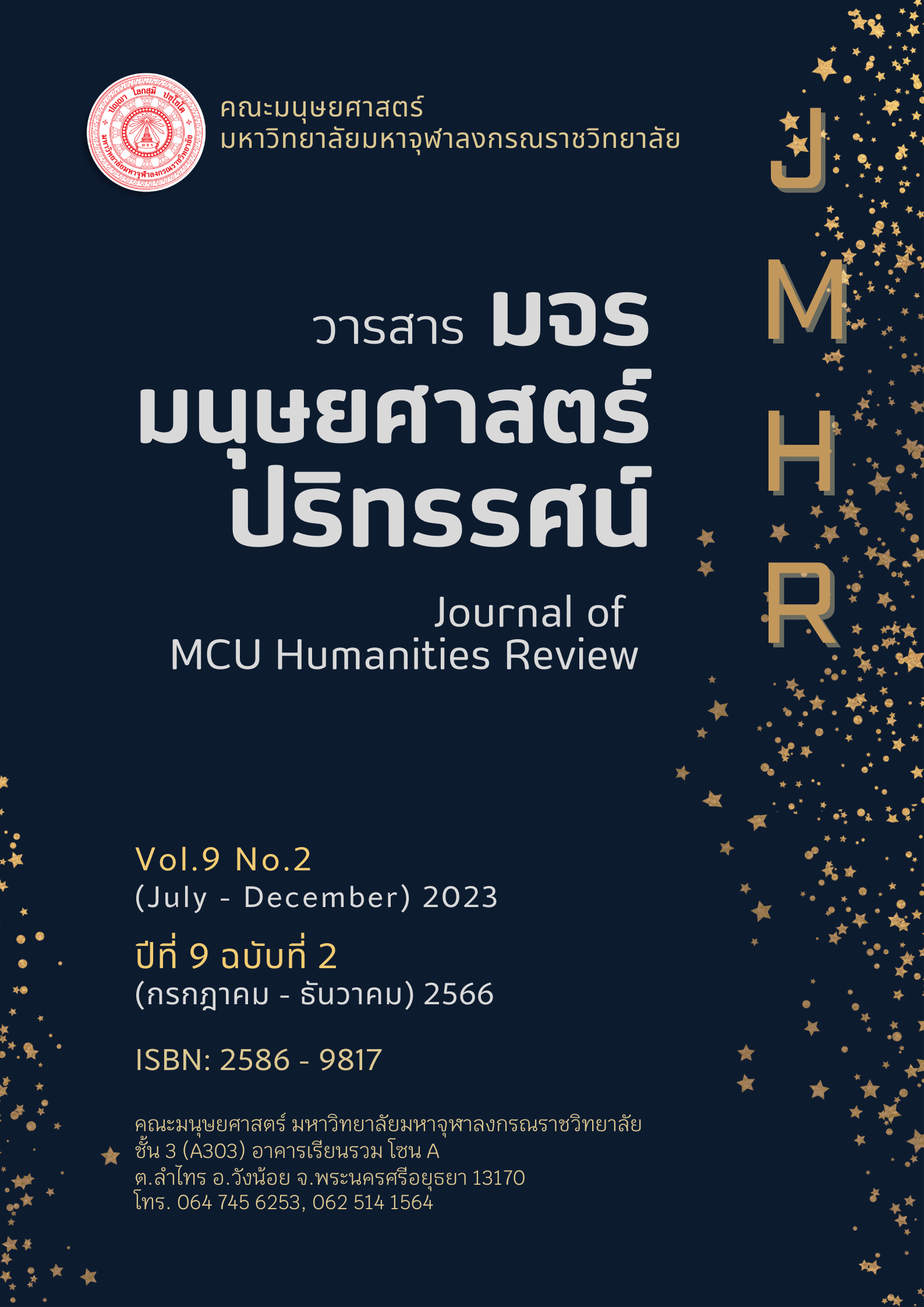การเสริมสร้างองค์กรแห่งความสุขตามแนวพุทธจิตวิทยาของบริษัทไพบูลย์กิจธนาจำกัด
คำสำคัญ:
การเสริมสร้าง, องค์กร, องค์กรแห่งความสุข, พุทธจิตวิทยาบทคัดย่อ
การสร้างความสุขตามหลักพุทธจิตวิทยา เน้นการเรียนรู้และการปฏิบัติเพื่อไปสู่ความพอดีหรือการมีดุลยภาพของชีวิต มีความสัมพันธ์อันกลมกลืนระหว่างการดำเนินชีวิตของบุคคลในองค์กรที่มีการปฏิสัมพันธ์กันกับสภาพแวดล้อมโดยรอบ มีความเมตตากรุณา รู้จักเอื้อเฟื้อเผื่อแผ่และเห็นอกเห็นใจผู้อื่น ซึ่งสิ่งเหล่านี้จะเป็นแนวทางการพัฒนาชีวิตของตนให้มีความสุขที่ยั่งยืน โดยการสร้างสุขตามหลักพุทธจิตวิทยาให้มีความสุข เป็นแนวทางในการพัฒนาตนให้มีชีวิตที่ดีงามและมีความสุขในการปฏิสัมพันธ์กับบุคคลในองค์กร ทำให้ให้องค์กรเกิดความสุขที่สามารถรับรู้ได้อย่างทั่วถึงซึ่งเป็นความรู้สึกสบายใจ ไม่ต้องห่วง ไม่ต้องกังวลเป็นจิตใจที่มีความสุขซึ่งเกิดจากการทำงานในเวลานั้นและการเกิดผลสำเร็จที่เป็นจุดมุ่งหมายของงานการจัดการความสุขของมนุษย์ด้วยการสร้างสมดุลระหว่างโลกในมิติส่วนตัว มุ่งเน้นความสุขของตนเอง โลกในมิติครอบครัว มุ่งเน้นความสุขของคนในครอบครัว และโลกในมิติสังคม มุ่งเน้นความสุขขององค์กรและสังคม (ทั้งสังคมภายในองค์การและภายนอกองค์การ) ซึ่งสอดคล้องรูปแบบแนวคิดองค์กรแห่งความสุข (Happy Workplace) เพื่อให้เกิดบรรยากาศในการทำงานที่ดี มีแรงจูงใจในการทำงานมากยิ่งขึ้นทำให้องค์กรเองก็จะได้รับประโยชน์จากการมีบุคลากรกระตือรือร้นเปี่ยมไปด้วยพลังแห่งความคิดและการเพิ่มผลการปฏิบัติงาน
บทความนี้ผู้เขียนได้เสนอมุมมอง การสร้างความสุขในการทำงานในองค์กรตามหลักพุทธจิตวิทยา ประกอบด้วย การสร้างสุขตามแนวทางหลักอิทธิบาท 4 และสังคหวัตถุ 4 เพื่อพัฒนาตนเองให้มีความสุข รู้จักแก้ไขปัญหา เรียนรู้การสร้างจิตที่งอกงามในการดำรงชีวิตและพัฒนาลักษณะทางจิตให้มีคุณธรรม จริยธรรมและความสุขพร้อมทั้งช่วยเหลือสังคมให้มีสุขตาม ดังนั้น สิ่งเหล่านี้สามารถนำพาบุคคลให้ไปสู่การดำรงชีวิตได้อย่างปกติสุข รวมถึง การใช้ชีวิตในสังคมส่วนรวมก็จะมีแต่ความสงบสุขไม่วุ่นวาย
เอกสารอ้างอิง
การประปาส่วนภูมิภาค. (2559). การใช้อิทธิบาท 4 เป็นแนวทางการทำงาน. สืบค้น 23 มีนาคม 2566, จาก https://reg7.pwa.co.th/kmr7/?p=406
ชาญวิทย์ วสันต์ธนารัตน์ และ ธีร์ธรรม วุฑฒิวัตรชัยแก้ว. (2559). มาสร้างองค์กรแห่งความสุขกันเถอะ (ฉบับปรับปรุง). กรุงเทพฯ: แอทโฟร์พริ้นท์.
ปรียาพร วงศ์อนุตรโรจน์. (2547). จิตวิทยาบริหารงานบุคคล. กรุงเทพฯ: ศูนย์สื่อเสริม.
พระพรหมคุณาภรณ์ (ป.อ.ปยุตฺโต). (2548). พจนานุกรมพุทธศาสตร์ ฉบับประมวลธรรม.สืบค้น 15 มกราคม 2566, จาก http://www.84000.org/tipitaka/dic/
d_item.php?
พุทธทาสภิกขุ. (2549). ความสุขสามระดับ. กรุงเทพฯ: ธรรมสภา.ราชบัณฑิตยสถาน. (2554). พจนานุกรมฉบับราชบัณฑิตยสถาน พ.ศ. 2554. สืบค้น 13 มกราคม 2566, จาก http://www.royin.go.th/dictionary/index.php
วณี ปิ่นประทีป และ สุรณี พิพัฒน์โรจนกมล. (บ.ก.). (2548). รวมตัวชี้วัดเกี่ยวกับความอยู่เย็นเป็นสุข. กรุงเทพฯ: สำนักงานปฏิรูประบบสุขภาพแห่งชาติ (สปรส.).
วัชระ งามจิตรเจริญ. (2552). พระพุทธศาสนาเถรวาท. กรุงเทพฯ: สํานักพิมพ์มหาวิทยาลัยธรรมศาสตร์.
ศิรินันท์ กิตติสุขสถิต และคณะฯ. (2555). คู่มือการวัดความสุขด้วยตนเอง HAPPINOMETER. กรุงเทพฯ: ธรรมดาเพลส.
สมชาย ศักดาเวคีอิศร. (2549). ปัจจัยที่ทำให้เด็กและเยาวชนกระทำผิดกับกระบวนการยุติธรรม (เอกสารวิชาการส่วนบุคคล เป็นส่วนหนึ่งของการอบรมหลักสูตรผู้บริหารกระบวนการยุติธรรมระดับสูง (บ.ย.ส.) รุ่นที่9. วิทยาลัยการยุติธรรม: สำนักงานศาลยุติธรรม. กรุงเทพฯ.
อภิชัย มงคล. (2552). รายงานการวิจัยเรื่องการพัฒนาและทดสอบดัชนีชี้วัดสุขภาพจิตคนไทย. กรุงเทพฯ: กรมสุขภาพจิต กระทรวงสาธารณสุข.
Diener, E. & Oishi, S., (2560). Are Scandinavians Happier than Asians: Issues inComparing Nations on Subjective Well – Being. สืบค้น 22 มีนาคม 2566, จาก http://www.psych.uiuc.edu/~edener/hottopic/diener–Oishi.pdf.
JobsDB. (2015). คนทำงานมีความสุขกับงานเพราะอะไร. สืบค้น 22 มีนาคม 2566, จาก https://shorturl.asia/oeR59
Lu, L., & Argyle, M. (1991). Happiness and cooperation. Personality and Individual Differences.12, 1019–1030.
Wittmann, P. (2003). A Guide to Happiness for the Third Millennium. Chiang Mai: Sangsilp Printing.
ดาวน์โหลด
เผยแพร่แล้ว
รูปแบบการอ้างอิง
ฉบับ
ประเภทบทความ
หมวดหมู่
สัญญาอนุญาต
ลิขสิทธิ์ (c) 2023 วารสาร มจร มนุษยศาสตร์ปริทรรศน์

อนุญาตภายใต้เงื่อนไข Creative Commons Attribution-NonCommercial-NoDerivatives 4.0 International License.






